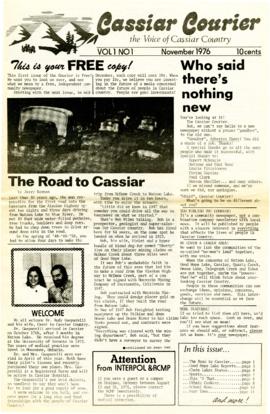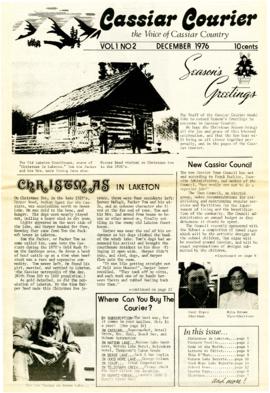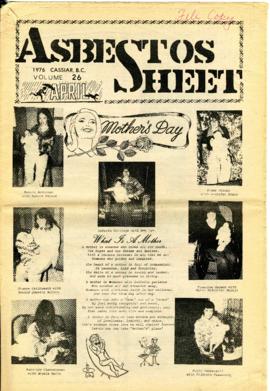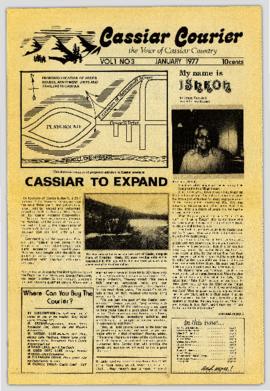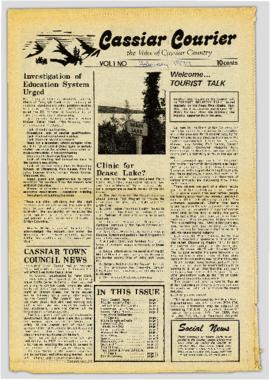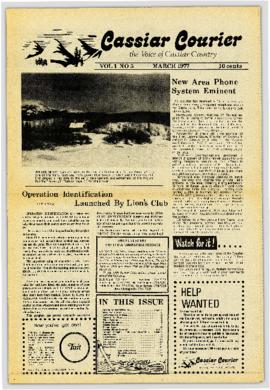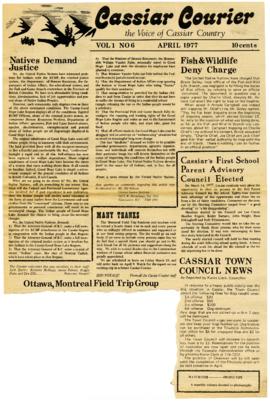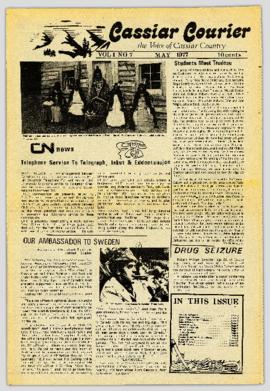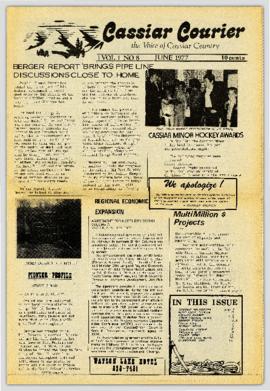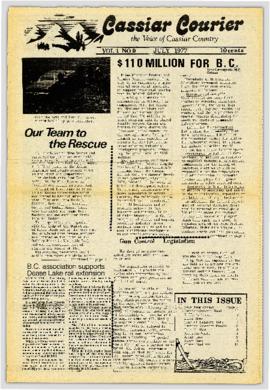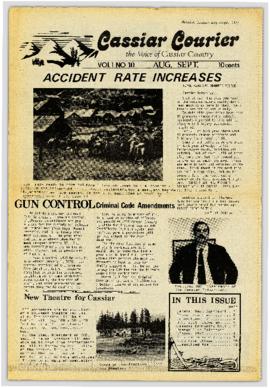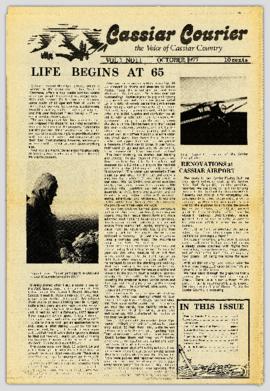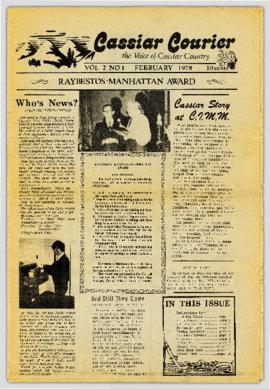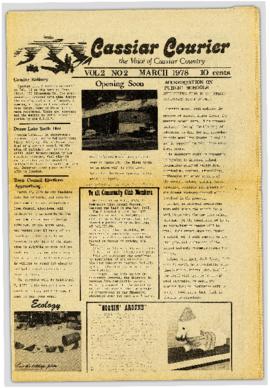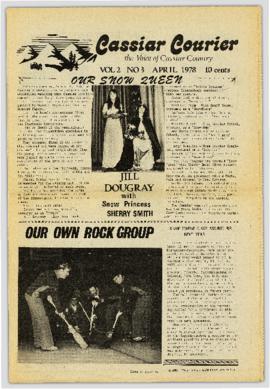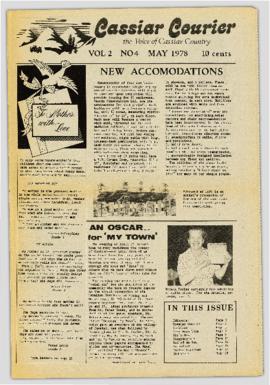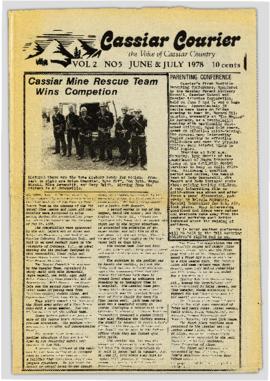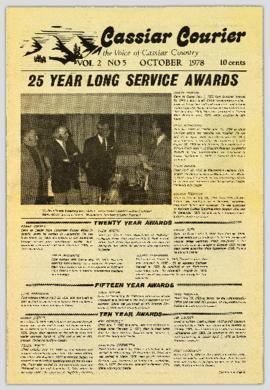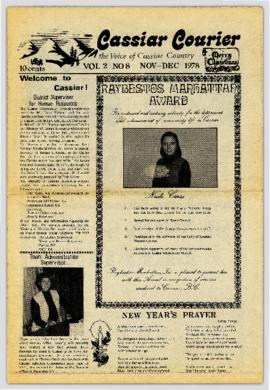Item is an original BC Forest Service "Management Manual" that was published circa 1955 and amended many times up to 1973.
File consists of a speech given by Gary Runka to the Agricultural Institute of Canada Land Use Committee entitled "Land Use Control and Jurisdictional Rights".
Commentary on this speech by Barry Smith of the Ministry of Agriculture and Lands:
"This is a first draft position paper written by GGR was developed for the Agricultural Institute of Canada, Land Use Committee.
The paper notes that attitudes are shifting from land being considered as a commodity to considering land as a natural resource. There are several references to governmental relationships, the inability to count on local governments to preserve agricultural land and the need for a federal land use policy supporting farmland preservation.
The use of a zoning tool as an effective means to preserve agricultural land is explored. The paper makes a strong case for there being no legal need for compensating land owners for regulatory land use zoning.
Included with the package are two letters written by GGR (November 7,1974) sent to Jim Lore (Alberta) and Steve Hart (Ottawa) requesting their review of the paper and input. A copy of the finalized paper, which may have been a jointly authored paper, is not included and it is not known if the paper was eventually published by the Agricultural Institute of Canada."
This souvenir program for the New York Harlem Aces Basketball Show. Includes autographs from Rip Collins, Smokey Johnson, Marty Garrett, William "Champ" Brown, K. Scott, and others. This souvenir program may have been obtained at a show in Prince George, BC (unconfirmed).
File consists of a speech given by Gary Runka entitled "Land Use Planning as it affects the Vegetable Industry".
Commentary on this speech by Barry Smith of the Ministry of Agriculture and Lands:
"GGR gives this speech as a representative of the B.C. Land Commission and is directed at vegetable industry reps.
The ALR is mentioned a number of times and it is noted that only 1 - 2% of BC is suitable for vegetable production. Several examples (8) of pressures on agricultural land are given.
GGR draws his audience's attention to the impact of speculation when stating:
"Substantial capital gain from land development or speculation unfortunately can to some degree subvert even the best planning. .... Fortunately, this type of speculation is now on somewhat shaky ground because of the Land Commission Act in B.C."
The overall message is that vegetable producers should involve themselves in land use planning."
This presentation transcript accompanies the 1973 BC Land Commission photographic slide and audio tape set entitled "Land Commission Act and the Agricultural Reserve Plan" that was used in original public hearings throughout the province. The presentation was given by Bill Lane, BC Land Commission Chair, and Gary Runka, BC Land Commission General Manager.
File consists of a speech given by Gary Runka entitled "Physical Resource Data Needs in Land Use Planning" which was given at a technical workshop to develop an integrated approach to base data inventories for Canada's Northland.
Commentary on this speech by Barry Smith of the Ministry of Agriculture and Lands:
"While the speech is not related to agriculture or farmland preservation directly, GGR emphasises the importance of data collection and mapping and its use in the planning process. The general principles he discusses were those employed in the development of the Agricultural Land Reserve.
The proceedings of the workshop were published in 1979 by Environment Canada." The proceedings are available online at: https://www.geostrategis.com/PDF/1974-04-17%20remote%20sensing%20for%20northen%20surveys%20and%20environmental%20monitoring-jean%20Thie%20CCRS%20copy.pdf
File consists of a speech given by Gary Runka to the BC Federation of Labour Environmental Conference entitled "Planned Development and Land Conservation".
Commentary on this speech by Barry Smith of the Ministry of Agriculture and Lands:
"GGR discusses the 'problem' of land being considered as either an "ecological natural resource" or "hot commodity".
He mentions that his background is in the natural sciences and land use planning and prefers to look at land as an ecological resource, not simply as a commodity.
The speech includes a quick review of the Land Commission's work and with reference to the Land Commission Act he makes the following observation (p.2):
"...the purpose is hardly necessary to relate to you - as what animal survives that destroys his food habitat next to his shelter or cover?"
The reason for BC's farmland preservation program could hardly be better stated."
File is a Resource Folio of maps and accompanying information created by Northwood Pulp & Timber regarding Timber Sale Harvesting Licence A01847, Willow River Block, Willow River P.S.Y.U. Includes maps that depict ungulates, waterfowl, recreation areas, special influence areas, and timber types. Most of the sheets have a duplicate, some with very slight variations. The following maps are supposed to be included in the but were missing upon arrival at the Archives: fish & topography, cutting permits & roads, and soils.
Item is an original report by Grant Hazelwood entitled "Mt. Assiniboine Park Trip, August 19-22, 1974". Includes original print photographs pasted into the report. The objective was to sample the lakes fishery at the south and north ends of the park and to examine some grizzly bear habitat on the Simpson River and examine the condition of guiding cabins in the same area.
File contains general correspondence, timber sale contracts, and logging inspection reports between the Department of Lands and Forests and the Fichtner Lumber Company Limited Limited.
File consists of notes written by Joan Sawicki for an untitled pending speech by Gary Runka.
Commentary on this speech by Barry Smith of the Ministry of Agriculture and Lands:
"Despite this being only 4 pages of rough notes, its focus on the initial work of the Commission and challenges of designating the ALR make it an historically important document.
For example it was initially thought the ALR would be guided by class 1 - 4 CLI ratings but this proved impractical in the north and range areas. An additional challenge was that parts of the province only had the benefit of 1:50000 mapping. This presented a very real problem for establishing the ALR.
One concern with this document is that because it is written in point form and consists of rough notes, it could be open to a degree of misinterpretation if not considered by an individual with experience in the administration of the ALR. For a much more refined statement on the B.C. Agricultural Land Preservation program and the designation of the ALR see Items [2020.4.2.1.23, 2020.4.2.1.24, and 2020.4.2.1.25]."
Item is an original "Mount Edziza Park Wildlife Report: An Argument for Nature Conservancy Status" report by W.G. Hazelwood, Parks Biologist. Includes original photographic prints pasted into the report. Also includes an accompanying "Mt. Edziza Wildlife Survey" from October 13, 1979.
Item is a photocopied report by T.C. Reid entitled "Liard River Hotsprings Park Natural History Observations". The report compiles natural history observations of Liard River Hotsprings, including a water chemistry report, weather observations, botanical report, ostrich fern growth, amphibian report, mammal report, bird report, and map and photograph orientation.
File consists of a speech given by Gary Runka to the BC Federation of Agriculture in Prince George entitled "The Land Commission and the Role of the B.C.F.A. Advisory Committee".
Commentary on this speech by Barry Smith of the Ministry of Agriculture and Lands:
"GGR uses this speech to particularly emphasize the work of the BCFA Regional Advisory Committees appointed to assist the Commission by providing advice.
Several specific examples are given of where the assistance of the Advisory Committees will be helpful.
GGR briefly outlines the work and challenges of the Commission to date. The speech ends with a list of six "general areas of concern". The list is very perceptive, revealing several of the challenges the Commission was facing at this early stage in the program including:
- Breakdown of viable production units through the sale of existing legal parcels;
- Rangeland tenure and management;
- Integrated use complications;
- Impact of major development proposals within or adjacent to the ALR;
- Small holdings owned by non-rural people in the ALR; and
- Urban re-direction away from the ALR and rural / urban interface conflicts.
The last line of p. 5 is partially hidden and reads: "...more than willing to meet with any of you individually as time permits."
Item is an original report entitled "A Fisheries and Wildlife Survey of the Burnie Lakes Park Proposal" by E. Osmond-Jones et al. for BC Parks branch biologist W.G. Hazelwood. Includes original photographic prints pasted into the report.
"The Cassiar Courier" is a newspaper that documents the community and work life of the residents of Cassiar BC. Content includes text and photographs, as well as jokes, comics, and games.
"The Cassiar Courier" is a newspaper that documents the community and work life of the residents of Cassiar BC. Content includes text and photographs, as well as jokes, comics, and games.
File consists of a speech given by Gary Runka to the B.C.I.A. entitled "Agricultural Land Reserves and the Land Commission Act".
Commentary on this speech by Barry Smith of the Ministry of Agriculture and Lands:
"With the original package associated with this speech are 5 pages of rough notes for another speech with the same title prepared for a B.C.I.A. meeting on March 22, 1976... Given that these rough notes were held with the material associated with the April 15, 1976 meeting it is possible the B.C.I.A. meeting planned for March was shifted to the April date. Additionally there are 6 pages numbered 6-11 that are of some detail concerning the work of the Commission but appear to be part of another speech but are included with the B.C.I.A. package and have, therefore, been [included with this speech].
The title of the speech "Agricultural Land Reserves and the Land Commission Act" sums up the thrust of the speech which notes the objectives of the legislation, the Commission's program of land acquisition and Commission research and support of innovative projects to assist rural planning to create a positive environment for agriculture and give direction to urban growth away from farmland.
Additionally an overview is provided of the Commission's activities in its first two years of operation. GGR comments that establishing the ALRs "... was but a first step and we feel that it is our job to continue to protect the Reserve by whatever approaches and methods of rural planning that are available to us". This speaks to a Commission that saw its role, even at this early stage, as being much more than simply a rationing board reviewing ALR applications.
Several examples are outlined in which it is suggested that professional agrologists should be looking at carefully.
At the end of the speech (p.5) GGR includes (a note to himself) to "follow with example of an agrologist's public statement" that obviously was of concern. The actual public statement was not included with the speech given on April 15th but was included in the rough notes of the speech dated March 22 which read as follows:
"Yet a member of the B.C.I.A. - a P.Ag - is quoted in the press in response to a local politician who asked him a question something like this in regard to an ALR exclusion application:
Local politician: What about the international, national and local concerns regarding land for future food production?
BOA member P.Ag: We should firstly be concerned with places for people to live and secondly worry about land for food production.
This is our profession - the image is yours to make.
I don't mean that we should go overboard, but if we are not willing to defend preservation of agricultural land - who is?"
File consists of notes for an untitled speech about "Experiences at the B.C. Land Commission" by Gary Runka at a Habitat 1976 panel at the United Nations Conference on Human Settlements, Vancouver between May 31-June 11,1976.
Commentary on this speech by Barry Smith of the Ministry of Agriculture and Lands:
"GGR gave this speech as part of a panel at Habitat 1976.
The speech outlines the scope of the legislation, background of a provincial zoning technique (based on technical information), the establishment of the ALR plans in each of 28 regional districts and commentary on some of the projects the Commission is involved with.
Providing context to the land-use planning environment that the B.C. farmland preservation program and ALR were thrust into in the mid-1970s, GGR remarks that:
"In many cases we have local governments making their first real strong attempt at land use planning. Backed by the strength of the Land Commission Act it is seen as a real change to control urban sprawl and linear development that is detrimental from other planning points of view, as well as from the agricultural land point of view."
The fact that GGR was asked to be part of the panel at the first United Nations Conference on Human Settlements speaks to the regard given the B.C. farmland preservation program."
File consists of a speech given by Gary Runka entitled "Problems and Solutions: The BC Land Commission Experience" at the Conference on Agricultural Land Preservation in Washington State at the University of Washington, Seattle.
Commentary on this speech by Barry Smith of the Ministry of Agriculture and Lands:
"This speech, written for and delivered to an international audience, reads like an article aimed at providing an historical overview of the first three years of the work of the Land Commission.
While succinct, it also has the quality of a comprehensive overview. Up to this point this is the best item in the collection explaining the background of the legislation, implementation and administrative challenges of the Commission over its first three years of operation.
Given when it was written - at a time when the formative history of the Land Commission was being made and by a person in the very centre of this history who was day-by-day helping to create this history - this is a singularly important document."
File consists of a speech given by Gary Runka to the Canadian Council on Rural Development entitled "Land Use Control".
Commentary on this speech by Barry Smith of the Ministry of Agriculture and Lands:
"This is another important document.
GGR covers several points including a discussion of the impact of changes to rural areas from the food producer's perspective. He notes that local governments are not well positioned to effectively achieve farmland preservation - but there is a need for a coordinated approach.
The point is made that good rural planning depends on good urban planning.
A summary is made of efforts at rural planning and farmland preservation in other North American jurisdictions. An example is outlined of the complexity of overlapping land use controls and returns to a common theme - "merging the reality of land as a commodity with the ethic of land as a natural resource"."
File consists of a contribution to a workshop given by Gary Runka entitled "The Use of Bio-Physical Information - BC Land Commission Overview". Includes excerpts from the Proceedings from the Workshop on Ecological Land Classification in Urban Areas, Canadian Committee on Ecological Land Classification, 23 & 24 Nov. 1976, Toronto.
Commentary on this speech by Barry Smith of the Ministry of Agriculture and Lands:
"Besides a copy of the speech, the package includes + a letter from Ed Wiken of the Canada Committee on Ecological (Bio-Physical) Land Classification to G.G. Runka dated October 1977 and a "Notice of Publication" + 1 copy of the published paper entitled "The Use of Biophysical Information - B.C. Land Commission Overview" by G.G. Runka, Chairman, B.C. Land Commission.
This speech was given to a workshop in Toronto and very closely resembles and reads like a draft of the published (polished) 3 page paper.
GGR remarks that:
"As you can appreciate, we often find ourselves in the centre of politically sensitive issues. For this and other reasons, the Commission might be described as being on the "firing line" with regards to the use of bio-physical information - it is the basis of our agricultural zoning and the basis of our everyday decisions regarding applications under the Act and changes to the Agricultural Land Reserve."
The speech and paper provide an important overview on the role of the Canada Land Inventory (CLI) agricultural capability ratings in the designation of the ALR and is especially important because the paper is written by the individual who was central to both the development of the CLI in B.C. and designation of the ALR.
The published paper forms pages 141 to 143 of the 167 page proceedings of the 1976 workshop."
Item is a reproduction of a report entitled "Delta Nature Reserve: Evaluation Study Prepared for Delta Parks and Recreation". This study was intended to provide information and make recommendations regarding the optimum use of the property.
"The Asbestos Sheet" is a newspaper that documents the community and work life of the residents of Cassiar BC. Content includes text and photographs, as well as jokes, comics, and games.
Item is an original "Kwadacha Park 1976" trip report by W.G. Hazelwood. Includes original photographic prints pasted into the report. Also includes a "Kwadacha Wilderness Park Proposal" accompanying map.
"The Cassiar Courier" is a newspaper that documents the community and work life of the residents of Cassiar BC. Content includes text and photographs, as well as jokes, comics, and games.
"The Cassiar Courier" is a newspaper that documents the community and work life of the residents of Cassiar BC. Content includes text and photographs, as well as jokes, comics, and games.
"The Cassiar Courier" is a newspaper that documents the community and work life of the residents of Cassiar BC. Content includes text and photographs, as well as jokes, comics, and games.
"The Cassiar Courier" is a newspaper that documents the community and work life of the residents of Cassiar BC. Content includes text and photographs, as well as jokes, comics, and games.
"The Cassiar Courier" is a newspaper that documents the community and work life of the residents of Cassiar BC. Content includes text and photographs, as well as jokes, comics, and games.
"The Cassiar Courier" is a newspaper that documents the community and work life of the residents of Cassiar BC. Content includes text and photographs, as well as jokes, comics, and games.
"The Cassiar Courier" is a newspaper that documents the community and work life of the residents of Cassiar BC. Content includes text and photographs, as well as jokes, comics, and games.
"The Cassiar Courier" is a newspaper that documents the community and work life of the residents of Cassiar BC. Content includes text and photographs, as well as jokes, comics, and games.
"The Cassiar Courier" is a newspaper that documents the community and work life of the residents of Cassiar BC. Content includes text and photographs, as well as jokes, comics, and games.
File consists of a speech given by Gary Runka entitled "Vegetable Situation in BC".
Item is an original "The Spatsizi and Stikine Rivers: Mainstem System Evaluations of Fishery and Recreation Values" by E.J. Osmond-Jones, Environmental Management Division, B.C. Parks Branch. Includes original photographic prints pasted into the report.
Item is an original report by Rob Cannings entitled "Biological Investigations of the Blue Rivers Headwaters Area, Wells Gray Park". Includes original photographic prints within the report.
File consists of a speech given by Gary Runka entitled "The Preservation of Agricultural Land and the Land Commission Act" at the U.B.C. Symposium for Arable Land: The Appropriate Use of a Scarce Resource. The speech includes the following attachments:
- General Evaluation Criteria for Applications
- Flow Chart - Exclusion Process
- Brief Resume of the types of applications and appeals under the Land Commission Act
Commentary on this speech by Barry Smith of the Ministry of Agriculture and Lands:
"GGR comments on private property rights vs. public interests and the shifting attitudes from seeing land as merely a commodity, to bought, sold and used at will, to recognizing land as a limited natural resource.
He reviews the loss of farmland and outlines how the ALRs were established. A six point list (p. 3) is included of the methodology used to designate the ALR. This is historically an important list because it goes into some detail on the utilization of the C.L.I., the process of designating the ALR plans.
GGR outlines the problems at the time of designation of adjusting the 'natural' CLI boundaries to 'straight' legal boundaries as well as the challenges posed by the scale of mapping.
He comments that applications consume considerable amount of the Commission's resources but efforts are being made to work with local governments on planning issues. GGR closes by listing seven areas of immediate concerns (p. 7).
After 38 years it would be worth reflecting on how many of these "immediate concerns' are still challenging the Commission."
File consists of a speech given by Gary Runka entitled "Resource Use Conflicts - The Fight Over What's Left" at the Canadian Bar Association Winter Meeting, Harrison Hot Springs.
Commentary on this speech by Barry Smith of the Ministry of Agriculture and Lands:
"The panel discussion that GGR was participating in was entitled "Resource Use Conflicts - The Fight over What's Left".
GGR makes the point that without legislative steps to preserve agricultural land in BC, what would be left in terms of farmland in not too many years would be "nothing at all". After this reinforcement of the need for the Land Commission Act he explains briefly the designation of the ALRs and comments at length on the different types of applications.
It is explained that the ALR is based upon agricultural capabilities of the land:
"In other words, a soil/climate combination. The ALR is aimed at preserving agricultural land in the long term. Factors, such as parcel size, economic viability, current market conditions, ownership etc. play little or no role in the decision-making process."
In light of a considerable amount of the Commission's workload being focused on the processing of applications GGR remarks that:
"If we are sincere in our attempts to preserve an agricultural land base for future generations of British Columbians, we must regard the ALR as only a first step of many that are needed."
A flow chart is referred to but not included in the package."
Item is an original "Atlin Park Lake Trip Report" by W.G. Hazelwood. Includes original photographic prints pasted into the report.
Item is a photocopied report by Don Miller entitled "Observations of Caribou and Caribou Environment in Northern and Southern Tweedsmuir Park and Wells Gray Park in Summer of 1977 with Comments on Related Observations in Spatsizi Park during Spring".
"The Cassiar Courier" is a newspaper that documents the community and work life of the residents of Cassiar BC. Content includes text and photographs, as well as jokes, comics, and games.
"The Cassiar Courier" is a newspaper that documents the community and work life of the residents of Cassiar BC. Content includes text and photographs, as well as jokes, comics, and games.
"The Cassiar Courier" is a newspaper that documents the community and work life of the residents of Cassiar BC. Content includes text and photographs, as well as jokes, comics, and games.
"The Cassiar Courier" is a newspaper that documents the community and work life of the residents of Cassiar BC. Content includes text and photographs, as well as jokes, comics, and games.
"The Cassiar Courier" is a newspaper that documents the community and work life of the residents of Cassiar BC. Content includes text and photographs, as well as jokes, comics, and games.
"The Cassiar Courier" is a newspaper that documents the community and work life of the residents of Cassiar BC. Content includes text and photographs, as well as jokes, comics, and games.
"The Cassiar Courier" is a newspaper that documents the community and work life of the residents of Cassiar BC. Content includes text and photographs, as well as jokes, comics, and games.
File consists of an untitled speech to the Chilliwack Chamber of Commerce regarding land use planning and its impact on the food producer.
Commentary on this speech by Barry Smith of the Ministry of Agriculture and Lands:
"These 3 pages of notes prepared for a speech given to the Chilliwack Chamber of Commerce are packed with several important themes and is a more refined version of [2020.4.2.1.24].
Some of the important themes mentioned include:
- Preserving the option of agriculture in BC will not be accomplished by preserving agricultural land alone;
- Prior to the ALR we were losing our best farmland first;
- BC is attempting to become more self-sufficient in food production;
- BC agriculture is diverse but lacks large volumes of any single commodity;
- Rural areas must be carefully planned to protect food production and not thought of as a storehouse of future urban development;
- With land use planning it is often difficult to see benefits in the short term but losses for a few people should amount to long term gains for many; and
- Several examples are provided of initiatives aimed at protecting rural areas, habitat etc.
The speech notes include the first mention of the work of the Ministry of Agriculture's Greenzone Committee and its efforts to find ways of reducing land use conflicts.
Many of these themes have been considered in previous speeches but are consolidated here and the paper ends with a need for food producers to get involved in land use planning process."
File consists of a speech given by Gary Runka entitled "Private Land Needs and the BC Agricultural Land Commission Experience" for the Perspectives on Natural Resources Symposium II at Sir Sanford Fleming College in Lindsay, Ontario.
Commentary on this speech by Barry Smith of the Ministry of Agriculture and Lands:
"This represents a major, out of province speech. It covers some familiar historic themes concerning the implementation of the BC farmland preservation program but also provides other interesting insights. It includes an informative summary of the land scarcity problem particular to BC.
With the designation of the ALR complete, the much more difficult task is: "... to make the right land-use decisions within the agricultural zone and encourage good land use planning adjacent to it in order to accomplish the stated objectives." This statement clearly establishes the perspective that the ALC is not just focused on land within the ALR but believes its protection mandate extends beyond the bounds of the Reserve.
GGR states that for competing uses there are normally non-agricultural alternatives but: "...the ability and willingness to go in these other directions necessitates a radical change in thinking on the part of governments, private industry, real estate interests, and the general public." Fourteen competing land uses are noted.
It is noted that the ALC Act "...has provided impetus for more formal planning at the local and regional levels..." - a fact all too often missed.
GGR reviews the types of plan policies that will assist the preservation of farmland and support the continued farming of agricultural land.
A number of specific initiatives are noted and mention is made of the urban / rural fringe problems and the work of the Ministry of Agriculture Green Zone Committee. Mention is made of the challenges associated with dealing with conflicts with other provincial and federal agencies.
The paper is summarized with three general approaches to looking at land needs, land uses and resource planning drawn from GGR's personal experience:
- Canada can't afford many more mistakes in the area of land resource allocation and making land-use decisions on the basis of the land's inherent natural characteristics is more reliable and sensible than based on the protection of property values and simply accommodating growth pressures;
- The ALC has learned that every move in rural planning and every decision in resource management has impact upon agriculture; and
- Agricultural land preservation represents a provincial priority and it has identified a direction around which all others can plan.
GGR closes - "In the final analysis, it is the process of planning that is important, the product itself is never quite finalized."
